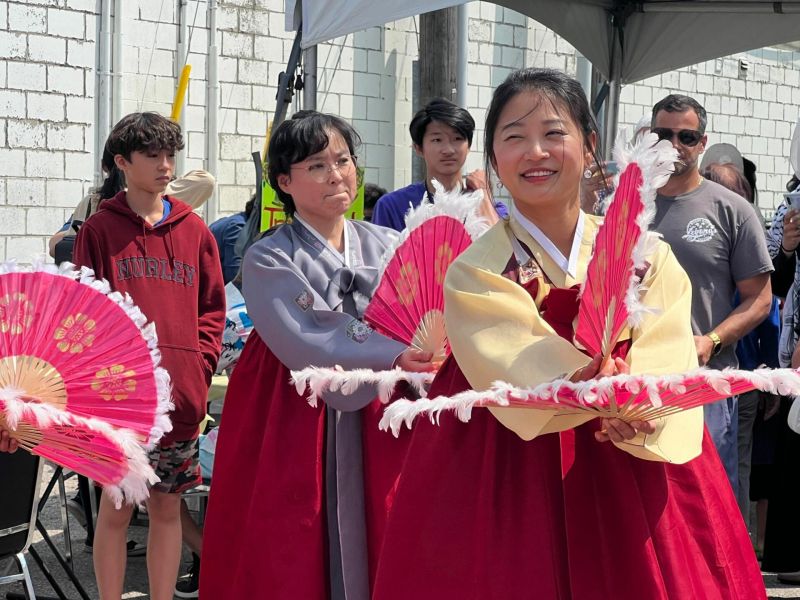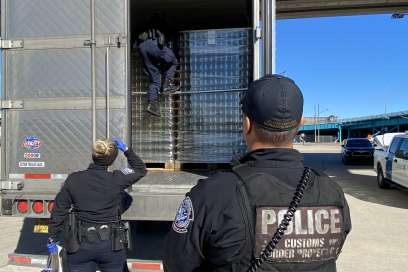Local Playwriting Contest Creates More Excitement Than Usual
Hello time traveller!!
This article is 349 days old.
The information listed below is likely outdated and has been preserved for archival purposes.
After a stage-worthy twist, Post Productions is continuing their tradition of rewarding local talent.
With filming for TV series (Up)Staged behind them, the local theatre company has announced their 2024 Windsor-Essex Playwriting contest winner. Following several submissions, a round of revisions and much deliberation, Panos Kirby’s Copracorn came out on top. As a result, the production will now be staged at the Shadowbox Theatre in 2025.
Although that’s usually where the story would end, this year’s result was only the beginning.
“Ultimately, it boiled down to which of two scripts was closest (in our informed opinions) to being ‘stage ready,'” said Fay Lynn, Post’s artistic director and contest judge/co-coordinator. “It was a long conversation and in terms of numbers, the scores were split down the middle between the six judges. Three judges scored Copracorn slightly higher with the other three giving the other script a higher score. [Judge] Kieran [Potter] was one of those rating the other play above the winner. It came down to the final vote and we went around the table judge-by-judge. One-by-one, five out of six judges voted for Copracorn. It came down to [Potter] and he hesitated. I thought he was too shy to vote against the group. The vote has to be unanimous in the end, so if he wanted to vote for the other play that meant the discussion would continue …When he squeaked out, ‘I… wrote Copracorn,’ time stopped. I have never to this day and may never again feel the level of pure shock, disbelief, and pride I experienced in that moment.”
Engaged to his father, Post Managing Director and contest coordinator/judge Michael K. Potter, Lynn knew that Kieran was a good writer with an eye for interesting characters. Still, the result caught Post’s artistic director off guard since she didn’t know he was interested in playwriting. Lynn also couldn’t believe the winner had kept his secret while living and reading the scripts with the contest coordinators and joining the panel.
Revolving around Haris, Copracorn is a darkly comedic fantasy that starts with the protagonist meandering through life in his small apartment. Passing the time talking with cockroaches and feeling like a loser, the post-pandemic economy has also left him jobless. With things looking bleak, the titular shapeshifting trickster appears to help Haris get his life on track. Unfortunately, it’s soon revealed that hope can be deceiving and those offering it are usually untrustworthy.
As for the contest itself, judges get a few weeks to read each entry after a March 31 deadline. Once finished, they score scripts with a rubric and prepare commentary. Compiled by Michael, the panel then meets to share opinions before selecting finalists for round two. Sometimes commentaries or scores get changed due to group discussion and different perspectives. This also informs feedback given to those who don’t move on in the contest.
Once finalized, the coordinator integrates these notes into overall commentary and adds this constructive criticism to decision letters each contestant receives. Afterwards, finalists get a month to revise their scripts and resubmit their edited work. From there, the first round process gets repeated until a winner is chosen. Those who don’t succeed get another batch of feedback to help improve after the contest.
Using this developmental structure, the goal is to help participants improve. Allowing feedback and revisions, scripts are generally elevated throughout the process.
It’s also how Kieran’s complicated journey got started.
“I didn’t intend to be a judge and a contestant, it just happened,” he said. “I wanted to enter a play anonymously to get honest feedback from the judges and just to see if I could. It’s one of those things that I always thought would be neat to do, like writing a book or making a movie — two more things that I would also love to be able to say I’ve done too. [Lynn] and Michael invited me to read the scripts with them, which was fine, but then they thought I had good input, and was experienced enough to join as a judge. So what could I do, say no? It would have been wildly suspicious!”
Joining Kieran, Lynn and Michael on the panel, (long-time judge and Revolution Youth Theatre Executive Director Shana Thibert also returned. Rounding out the group were new additions Dan and April Savoie from 519 Magazine and South Detroit Films.
Although competition was fierce, Copracorn was in contention from the start. With several off-kilter characters, fantastical elements, humour and wit that connected with judges, the first act was universally praised. Based on its creativity and those strengths alone, the play had no issues getting voted into the next round with three other finalists.
While judges enjoyed these aspects though, some major issues remained.
“Act two felt like the playwright was trying to tell a different story,” said Lynn. “It’s like he didn’t trust himself to follow the consequences he’d set up in the first act to their natural conclusions — almost like it somehow wouldn’t be ‘interesting’ enough. Part of my job as co-coordinator of the contest is anonymizing the scripts. I’m the only person involved in the contest who reads the submission emails and therefore knows the playwrights’ names and any other comments or context they’ve provided with their scripts. In the case of ‘Panos Kirby,’ he admitted that the second act was rushed and humbly agreed it wasn’t what he wanted it to be, but was happy to have completed a draft and was eager for feedback. It was the strength of the first act and the context I had knowing ‘Panos’ was ready to completely redraft )if he wasn’t already doing so,) that led me to vote Copracorn to move on as a finalist.”
It’s an assessment Kieran agrees with.
“My second act sucked,” he said. “It ended up being an office drama that quickly devolved into an armed robbery? The motivations were all so half-baked and uninteresting. Thank God I ditched all of that. It led to me taking a hard left and introducing my actual favourite character in the play.”
Originally finishing his script minutes before the contest deadline, the playwright frantically thumbed his keyboard to ensure he’d be eligible. No longer in the backseat as Michael and Lynn listened to music on a long drive, Kieran now had 30 days to fix the second act.
Making the most of his time, the eventual winner started focusing on what didn’t work. This meant cutting a plot centred around Haris and Copracorn’s workplace mischief, a “whack-job” misogynist coworker and convenience store robbery with a stolen gun. Such elements had the main protagonist acting out of character, reducing Kieran’s own experiences and vision for the play.
One small scene was kept mostly the same, but the playwright scrapped everything else in the second act. Afterwards, he rewrote the end of act one to fit a new narrative. With this groundwork complete, Kieran was then free to explore a different direction.
It was at this point things became sharper for the first-time playwright.
“Honestly, once I got started on it, the whole thing came together so clearly,” said Kieran. “Sometimes you have to write out a terrible idea onto the page to make room in your brain for new, and much better ideas (laughs.) That’s definitely what happened here. My own experiences are baked into this play all over the place. I don’t want to give away too much but at its core, Copracorn is a recounting of my own struggles after moving out of my parents’ home. It’s my struggles to ‘make it’ on my own.”
Describing the story as “two years of my life condensed and repackaged with a fresh layer of primer, paint and sparkles on top,” the winner feels his play is struggle personified. Keeping that in mind, he used his own experiences with a roommate, stories he’d heard from others, art block, loss, and realizing what his place in the world was to fuel the reworked second act.
Once these core issues were fixed, the playwright then tackled some logistical feedback as well.
“From a production point of view, [Copracorn] also had too many settings so that needed to be addressed,” said Thibert. “Kieran was brilliantly able to rewrite the weaker story aspects and fix the settings issue without losing any of the story he was trying to tell. He brilliantly streamlined the production side and created an incredibly cool way to change settings without ever actually having to change the set. It was brilliant.”
Mirroring his play as struggle personified however, Kieran continued as a judge while keeping his double life a secret. Being so much a reflection of himself, the playwright was terrified someone would find out he’d been keeping his secret as long as he did. In addition, the piece also had a lot of Kieran’s landmarks and direct references to things Michael and Lynn would know.
Going through scripts together didn’t help matters either.
“We would read the plays together at home, discuss amongst ourselves and then go make our own notes,” said Kieran. I remember when we reached a certain scene where Haris goes on a societal rant and said, almost verbatim, something that I had complained to [Lynn] about a few days prior …I was so certain I was caught red-handed. I wasn’t, but my neurons were firing off like crazy. I was so sure I would be caught and that feeling never went away until the day of the final vote.”
Coming from the opposite side, the artistic director had no idea.
“I vividly remember discussing Copracorn with Kieran after we’d read it and submitted our individual feedback,” said Lynn. “I wonder now if he thought I was suspicious and trying to suss him out. For me it was like discussing any other play or movie, he never let on for a second. It’s funny to me now to think of what was going through his mind and puts some things into perspective, like moments he may have been quieter than usual or suddenly eager to talk about something else.”
On top of being somewhat on guard, the playwright also felt guilty throughout the process. Fearing the possibility of being found out in the wrong way or time, he worried that it could hurt the contest or company’s reputation. Kieran also wasn’t sure about revealing his identity initially, but that changed when he realized how exhausting keeping his secret would be. Instead, the judge decided on the day of the final vote that he’d reveal his identity if he won.
Going into the roughly three hour meeting, four scripts were theoretically in contention. Two entrants had submitted scripts and become finalists before. Incorporating feedback from the previous round, each script showed improvement from where it started.
Looking at everything, plays incorporating such advice more than others set them apart.
“Of the four finalists we had this year, the two scripts that we ultimately had to decide between for the winner were the ones that made the most extensive use of round one feedback,” said Michael. “It wasn’t a real surprise because that’s how it usually goes. This doesn’t mean that the other playwrights didn’t use the feedback. They all did and I’d say they were conscientious about it. What ultimately kept their scripts from being considered in the final vote was difficulty or reluctance in pushing themselves past the point of comfort. That’s something we all face as writers, in my experience. I still think all four of our finalists in 2024 can become excellent scripts ready to be produced with a little more work though.”
Although choosing between both scripts was difficult, judges felt that Copracorn was close to its final draft. Given how quickly he rewrote the second act, the panel also believed Panos Kirby could make any necessary changes in a timely fashion.
Now ready for the final vote, tension built as Kieran’s anxiety grew.
“God. The moment of the reveal was so surreal,” he said. “I hate to play into cliches, but my heart pounded away, it felt like time slowed and all that other stuff that happens when things have gone both incredibly right and wrong at the same time. They went around the table, a simple ‘aye’ or ‘nay’ if Copracorn should win. It went all around the table, ‘aye,’ ‘aye,’ ‘aye,’ ‘aye,’ ‘aye’ and it came back around to me as the final judge. It was probably only a few seconds, but I was in that moment for ages before squeaking out an ‘I… wrote Copracorn,’ followed by puzzled silence and then an uproar of shock, delight and confusion. I remember [Thibert] slapping her hands on the table yelling out ‘no way!’ and Michael’s quiet confusion that built into excitement. Everyone was completely taken off-guard, which was kind of exhilarating since I was sure I was at least suspected. Apparently I wasn’t.”
The reveal also resulted in mixed emotions for Kieran’s father… one of them being anxiety as well.
“When the big reveal happened after we’d all voted, it took my brain a while to process what was happening — I’m not sure how long, to be honest,” said Michael. “It just didn’t feel real. The only way I could make sense of it at first was to assume that Kieran was kidding about writing Copracorn which, to be clear, seemed quite inappropriate at that moment. When I realized he was serious I felt a complex gumbo of emotions that I hadn’t felt before. Shock was definitely one of them. Also bewilderment. Also delight because it was such an unexpected and funny situation. Definitely a lot of pride for obvious reasons. Then, me being me, anxiety over whether this situation was allowed and how we should handle it. Whatever I’m feeling at any given moment, the next step is always anxiety.”
After discussing it thoroughly, everyone agreed the contest’s format prevented any bias. Scripts were anonymized and treated equally by judges with extensive experience in writing, storytelling, reading and developing scripts for stage and film. Even before Kieran abstained and revealed himself, five out of six judges voted for his script without knowing he wrote it. Removing Michael and Lynn as well, the remaining panel still chose Copracorn unanimously.
If that wasn’t enough to satisfy skeptics however, at least one judge has her own suggestion.
“Come see the show when it is staged,” said Thibert.” You can decide for yourself based on what the show makes you feel. I can guarantee people will love it and understand why it won. As a judge, it was the clear winner for me regardless of who wrote it.”
Determined not to enter any contest under a pseudonym again,Kieran maintains he got a lot out of the experience. Having never written a play before, the winner encourages those on the fence to just do it. Noting that no one can predict what they’re capable of until they try, the playwright thinks it’s important to push past fear and take chances. While it won’t lead to something perfect, Kieran believes it only brings out the humanity in those taking part.
After going through this himself, the playwright knows that telling a story makes everything worth it.
“It’s funny actually,” he said. “I started writing Copracorn for the playwriting contest the previous year but never made it past the first few pages. Why? I don’t know. I was overwhelmed, I guess. But revisiting it a year later it just made so much more sense to me. I had finally experienced enough life events to recontextualize what I was actually writing. I hadn’t connected the dots yet, that I was writing about myself. It’s funny how that can happen. Live your life, experience things, make notes on your thoughts, your surroundings, the people you’re with. There’s always so much going on if you look for it. It may sound like lazy advice, but the best way to write is to write.”
Kieran also has a recommendation for anyone looking to follow in his footsteps.
“At the moment Joey Ouellette is teaching some acting, improv, and writing courses, all of which I would highly recommend and I assure you are very beginner friendly,” said the playwright. “His courses are how I got started taking my own writing more seriously).”
Those interested in the three six week acting, improv and creative writing courses can sign-up online before the October 21 deadline. Taking place on Mondays through Oct. 21, 28; Nov. 4, 11, 18 & 25, each course costs $99 or two for $175.
From taking these courses to winning the playwriting contest, Kieran has learnt a lot from Post Productions. Although it’s clear he won’t be submitting a script to compete next year, the playwright hopes to be on the panel and continue learning from the experiences.
After all, as another judge realized this year, a different perspective can be just as educational.
“To be the father of this year’s winner brings me even more pride,” said Michael. “I’m also finding a lot of welcome humility. Reading Copracorn, evaluating and discussing it with others, this entire process has shown me that although we can have an influence on the development and paths of our children, that influence really is quite small compared to what comes from within. Everything that makes Copracorn a wonderful, charming, funny, and engrossing script comes from Kieran’s individual mind and personality, the meaning he’s created from his experiences. Now that I’ve read Copracorn, I feel like I understand him at a depth that was otherwise inaccessible to me.”
























